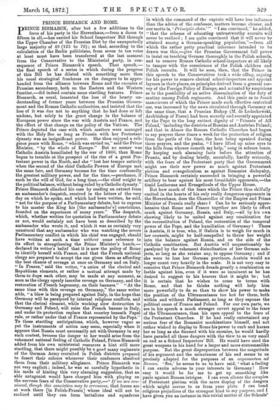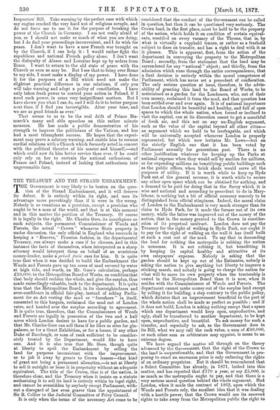went and the Roman Catholic authorities, and insisted that the
use, was increased by the news circulated through Germany at loss of it was due not to anything that he had done or left the same time, that a Prussian Bishop (M. de Ledochoweki, undone, but solely to the great change in the balance of Archbishop of Posen) had been secretly and recently appointed European power since the war with Austria and France, and by the Pope to the long extinct dignity of " Primate of All the effect of that change on the policy of the Vatican. The Poland," including the districts of Russian and Austrian Poland; Prince depicted the ease with which matters were managed and that in Alsace the Roman Catholic Churches had begun with the Holy See so long as Prussia with her Protestant to say prayers three times a week for the protection of religion dynasty was an insignificant power. She then enjoyed a reli- from the perils of the time, the host being upraised during gious peace with Rome, " which was envied us," said the Prime these prayers, and the psalm, " I have lifted up mine eyes to Minister, " by the whole of Europe." But no sooner was the hills from whence cometh my help," sung in solemn tones. Catholic Austria humiliated by the war of 1866, than Rome By keeping such alarming facts before the attention of began to tremble at the prospect of the rise of a great Pro- Prussia, and by dealing briefly, scornfully, hardly seriously, testant power in the North, and she " lost her temper entirely with the fears of the Protestant party that the Government when the second of the chief Catholic Powers of Europe met might use their new power as much against Protestant the same fate, and Germany became for the time confessedly pietism and evangelicalism as against Romanist disloyalty, the greatest military power, and for the time,—perchance, if Prince Bismarck certainly succeeded in bringing a powerful such be the will of God, for a long time,—the chief weight in artillery to bear against his most formidable opponents,—the the political balance, without being ruled by a Catholic dynasty." timid Lutherans and Evangelicals of the Upper House.
Prince Bismarck clinched his case by reading an extract from But how much of the fears which the Prince thus skilfully an ambassador's despatch, received in the letters of the very excited in the hearts of his only really dangerous opponents in day on which he spoke, and which had been written, he said, the Herrenhaus, does the Chancellor of the Empire and Prime
vehement national feeling of Catholic Poland, Prince Bismarck an end as a School Inspectors' Bill. He would have used the added from his own ministerial resources a hint still more great weapons in his hand for a larger and more statesmanlike startling, that there might possibly be a good many regiments purpose. But the great disproportion between the magnitude of the German Army recruited in Polish districts prepared of his argument and the minuteness of his end seems to us to desert their colours whenever their confessors absolved precisely adapted for the purposes of an argurnentum ad them from their military allegiance. Prince Bismarck was Romam. See,' he seems to us to have said, what a feeling not very explicit ; indeed, he was so carefully hypothetic in I can excite adverse to your interests in Germany! How his mode of hinting this very alarming suggestion, that an easy it would be for me to get up something like able antagonist would have charged him with playing on panic against Roman intrigue. I can even silence the scruples the nervous fears of the Conservative party,—" If we are con- of Protestant pietism with the mere display of the dangers meal, though this conviction may be erroneous, that forces are which might accrue to us from your plots. I can bend at work there [in Polish-Prussia] whose ideal will not be religious prejudices of the strongest kind to my purpose, and I realized until they can form battalions and squadrons have given you an instance in this trivial matter of the Schools'
in which the command of the captain will have less influence PRINCE BISMARCK AND ROME. than the advice of the confessor, matters become clearer, and
PRINCE BISMARCK, after but a few additions to the our motto is, Principiis obsta.' " "I am convinced," he added, force of his party in the Herrenhaus,—from a dozen to " that the scheme of educating untrustworthy recruits will fifteen in all,—has carried his School Inspectors' Bill through never be realized ; I am quite convinced that it will never be the Upper Chamber of the Prussian Diet by the unexpectedly attained among a German-speaking population,"—from all large majority of 49 (125 to 76) ; so that, according to the which the rather petty practical inference intended to be calculation of the Berlin politicians, from seven to ten votes drawn was this,—give the Prussian Government full power at least must have been transferred at the last moment to insist on teaching German thoroughly in the Polish schools, from the Conservative to the Ministerial party, in con- and to remove Roman Catholic school-inspectors at all likely sequence of Prince Bismarck's speech. That speech,— to tamper with the consciences of the Polish children and the final speech of a series in which during the progress Polish recruits. It will be seen, then, that the Prince in of this Bill he has dilated with something more than this speech to the Conservatives took a wide offing, arguing his usual strategical frankness on the dangers to be appre- for his power to remove clerical school-inspectors and appoint hended from the alliance between Rome and the enemies of laymen in their places, on principles derived from a general sur- Prussian ascendancy, both on the Eastern and the Western vey of the Foreign Policy of Europe, and actuated by suspicions frontier,—did indeed contain some startling features. Prince as to the possibility of an active dissemination of the duty of Bismarck, as usual, lamented the loss of the hearty un- mutiny among Polish regiments. And this panic as to Jesuit derstanding of former years between the Prussian Govern- manoeuvres of which the Prince made such effective oratorical
went and the Roman Catholic authorities, and insisted that the use, was increased by the news circulated through Germany at loss of it was due not to anything that he had done or left the same time, that a Prussian Bishop (M. de Ledochoweki, undone, but solely to the great change in the balance of Archbishop of Posen) had been secretly and recently appointed European power since the war with Austria and France, and by the Pope to the long extinct dignity of " Primate of All the effect of that change on the policy of the Vatican. The Poland," including the districts of Russian and Austrian Poland; Prince depicted the ease with which matters were managed and that in Alsace the Roman Catholic Churches had begun with the Holy See so long as Prussia with her Protestant to say prayers three times a week for the protection of religion dynasty was an insignificant power. She then enjoyed a reli- from the perils of the time, the host being upraised during gious peace with Rome, " which was envied us," said the Prime these prayers, and the psalm, " I have lifted up mine eyes to Minister, " by the whole of Europe." But no sooner was the hills from whence cometh my help," sung in solemn tones. Catholic Austria humiliated by the war of 1866, than Rome By keeping such alarming facts before the attention of began to tremble at the prospect of the rise of a great Pro- Prussia, and by dealing briefly, scornfully, hardly seriously, testant power in the North, and she " lost her temper entirely with the fears of the Protestant party that the Government when the second of the chief Catholic Powers of Europe met might use their new power as much against Protestant the same fate, and Germany became for the time confessedly pietism and evangelicalism as against Romanist disloyalty, the greatest military power, and for the time,—perchance, if Prince Bismarck certainly succeeded in bringing a powerful such be the will of God, for a long time,—the chief weight in artillery to bear against his most formidable opponents,—the the political balance, without being ruled by a Catholic dynasty." timid Lutherans and Evangelicals of the Upper House. Inspectors' Bill. Take warning by the perfect ease with which my engine cracked the very hard nut of religious scruple, and do not force me to use it for the purpose of breaking the power of the Church in Germany. I am not really afraid of you, or I should not make so much of what you are doing, but I do find your proceedings inconvenient, and I do wish for peace. I don't want to have a new French war brought on by the Church, if I can help it : I would rather fight the republican and national French policy alone. I don't want the disloyalty of Alsace and Lorraine kept up by orders from Rome. I want to return to the old state of peace with the Church as soon as may be. But I see that to bring over Rome to my side, I must make a display of my power. I have done it for the purposes of a Bill which need not make the slightest practical difference in our relations, if only you will take warning and adopt a policy of conciliation. I have only taken fresh power to control your action in Poland, if I need such power, in some very insignificant matters. But I have shown you what I can do, and I will do it to better purpose next time, if I find you incorrigible. Alter your tone, and we are as good friends as ever.'
That seems to us to be the real drift of Prince Bis- marck's many and able speeches on this rather minute measure. He has made a public demonstration of his strength to impress the politicians of the Vatican, and has had a most triumphant success. He hopes that the experi- ment may prove a salutary warning, and enable him to resume cordial relations with a Church which formerly acted in concert with the political theories of his master and himself,—and which could now do him better service than ever, if he could only rely on her to restrain the national enthusiasm of France and Poland, instead of lashing that enthusiasm into ungovernable fury.



































 Previous page
Previous page